The New York Buddhist Church is located along the Hudson River at 331-332 Riverside Drive in Manhattan, New York City.
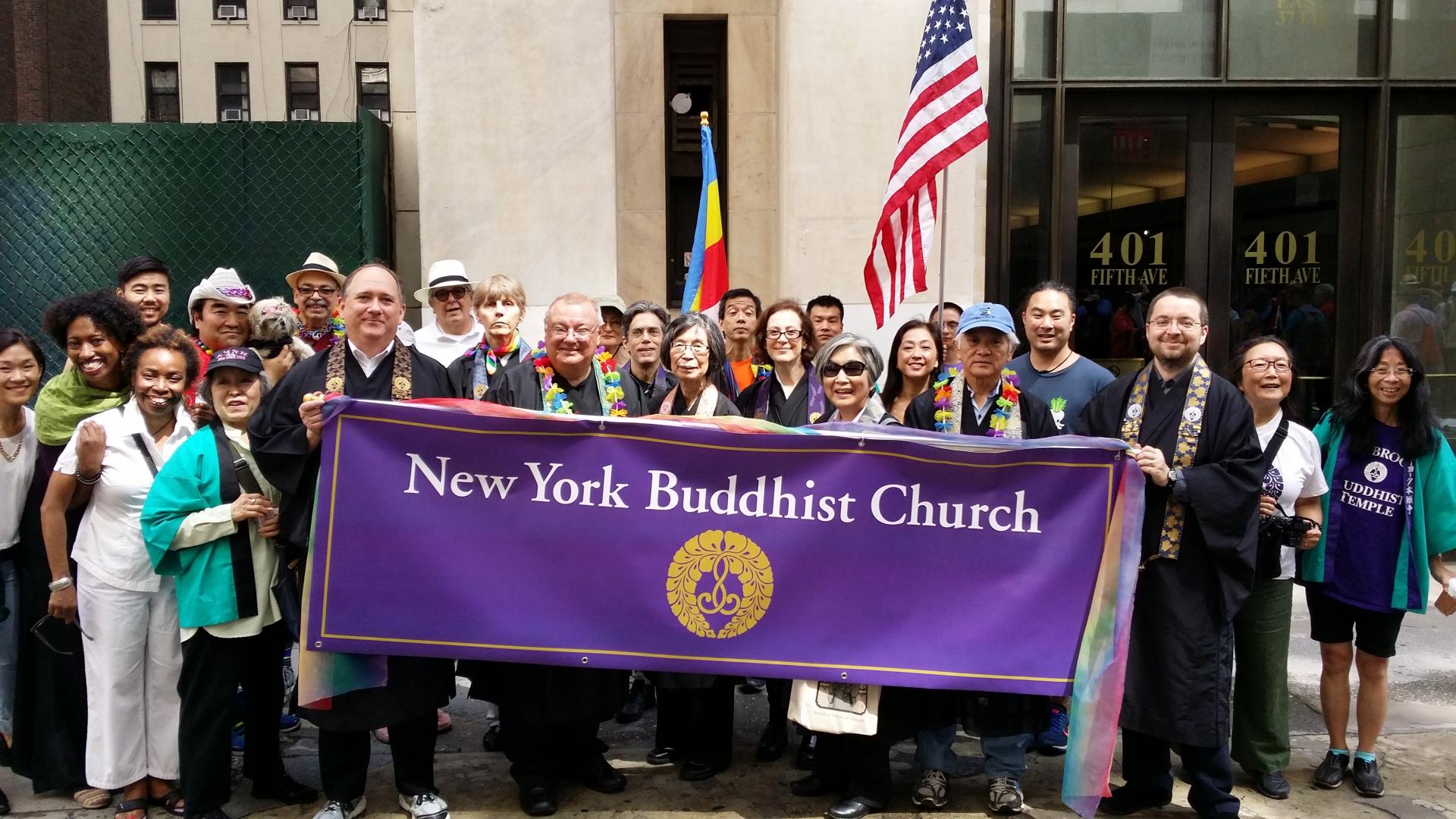
Founding
The NYBC was founded by Reverend Hozen Seki as a member church of the Buddhist Churches of America, which now has over 60 locations. Rev. Seki was born in Japan and ordained a Jodo Shinshu minister in Kyoto’s Nishi Hongwanji temple. In 1930, Rev. Seki moved to the United States to serve as a minister at the Los Angeles Buddhist Church. He then founded the Arizona Buddhist Church in 1933 before coming to New York. Upon its founding on the Upper West Side in 1938, the NYBC was the first Buddhist religious institution chartered in the state of New York.
During WWII, the FBI and War Location Authority believed that Buddhists would be loyal to Japan instead of America (despite a lack of evidence to support this claim). Buddhist ministers were considered especially dangerous and were removed from their communities. A few years after the church was founded, Rev. Seki was placed in internment camps by the US government. Rev. Seki’s wife, Satomi Seki, and many members of the NYBC worked to keep the church in operation. Once the war was over, Rev. Seki returned to lead the church, which saw impressive growth in its congregation and flourished in the postwar years.
In 1951, Rev. Seki founded the American Buddhist Study Center (named the American Buddhist Academy at the time). The goal of this establishment was to educate Americans about the teachings of the Buddha, even if they did not necessarily want to join the church. The ABSC states that its mission is to “[continue] in the founder’s footsteps to make Buddhist values available to all Americans.” In the 1960s, the church relocated so that the buildings were next to each other and so the study center could support the work of the church.
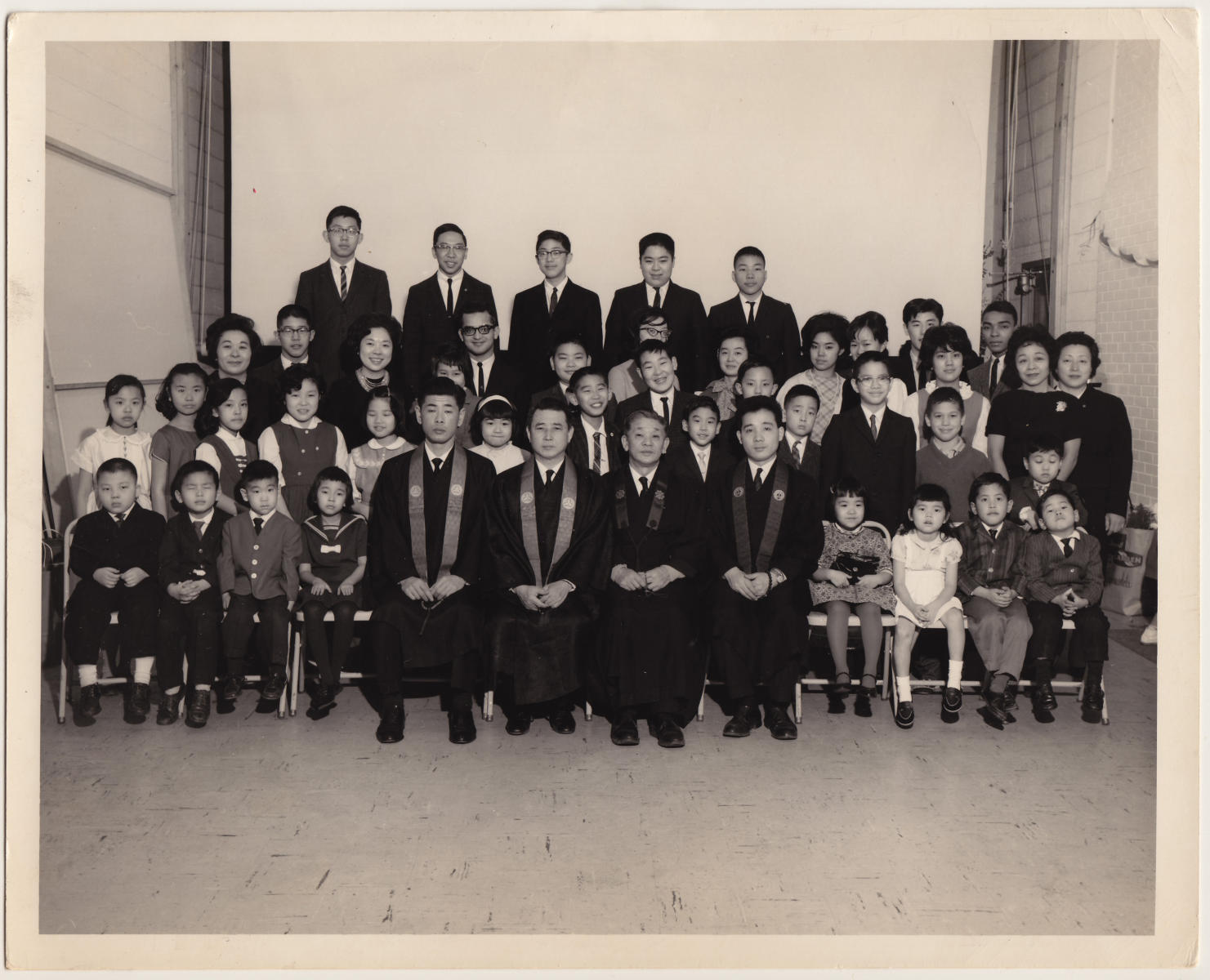
Tradition
The New York Buddhist Church is affiliated with the Jodo Shinshu tradition, also known as True Pure Land or Shin Buddhism. This is the most popular form of Buddhism in Japan, where Reverend Seki was born and ordained.
Jodo Shinshu believes that instead of toiling towards achieving enlightenment, Buddhists should open their hearts to their own enlightened nature. Happiness and awakening are not found externally, but instead when one looks within themself. This tradition includes laypeople, who can participate in the core practices: reciting the Nembutsu (vow of the Amida Buddha) and listening to the Dharma. By speaking the Nembutsu, Jodo Shinshu Buddhists express gratitude. The Amida Buddha created the Pure Land, which is a faster path to enlightenment accessible upon death, as long as practitioners trust the Amida Buddha with the Pure Land in mind. When listening to the Dharma, practitioners can let the teachings unfold in their minds. The NYBC website gives their definition of the listening practice: “Listening to the Dharma can mean listening to a sermon or lecture, but it can also mean listening or talking to anyone. You never know who might be your teacher of the Dharma, if you have the ears and heart to listen to life unfolding around you.”
Despite being rooted in Japanese tradition, the NYBC incorporates western influence, perhaps in an effort to assimilate but also to include interested Americans. The NYBC outlines its goals as not just to serve its sangha, but also to serve the greater community and to increase education about Buddhism, Asian, and Asian-American culture.
Western influence is exemplified in the choice to call the establishment a church instead of a temple. Practices include service on Sundays with Presbyterian-esque hymns and a combination of Japanese and English utilized within the service.
Despite being fully rooted within the Jodo Shinshu tradition, the NYBC retains a relationship with many other Buddhist traditions. A variety of Buddhist scholars, monks, and ministers from differing traditions come to speak and teach at the NYBC and ABSC. For example, D. T. Suzuki of the Zen tradition taught at the ABSC and spoke at the dedication of the statue outside the building. More recently, Tibetan monks came to the NYBC to create a sand mandala of the Buddha Amitayus.
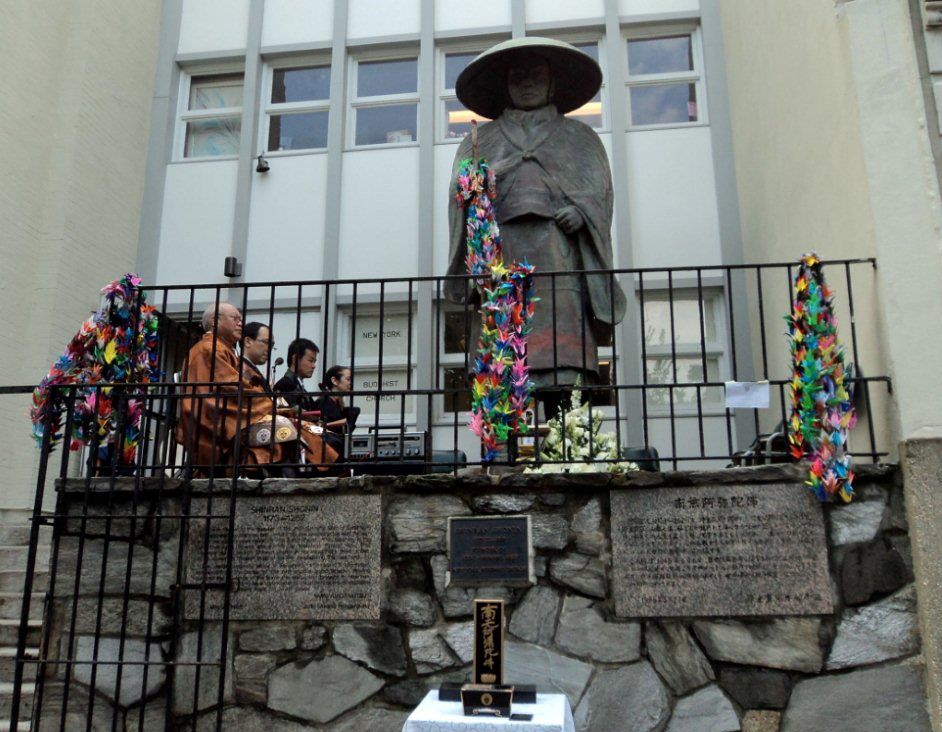
Constituency and Support
The NYBC is supported primarily by donations. Their website provides links to donate, as well as an outline for renovation plans and fundraising goals.
The church’s services are open to anyone, but those interested can pay for a membership that allows them access to additional services and benefits, but a portion of membership dues goes to the Buddhist Churches of America Organization. Member benefits include newsletters and reports, free and discounted classes and workshops, and eligibility to serve on the church’s board and vote in elections.
The 60+ Buddhist Churches of America have about 12,000 members combined. However, because services are open to the public, an even greater number of people participate and engage in services. The NYBC in particular serves a broad community, as it is located in the most populous city in the US. Lion’s Roar, in a profile of the NYBC, notes “The interplay of Japanese and Westernized forms continues even as the New York Buddhist Church has become home to a racially and ethnically diverse cross-section of New Yorkers.”
The American Buddhist Study Center also supports operations by offering a variety of courses, some of which are virtual and free, others of which one must pay to participate. The ABSC offers its own paid yearly membership, and also publishes a small selection of books available for purchase.
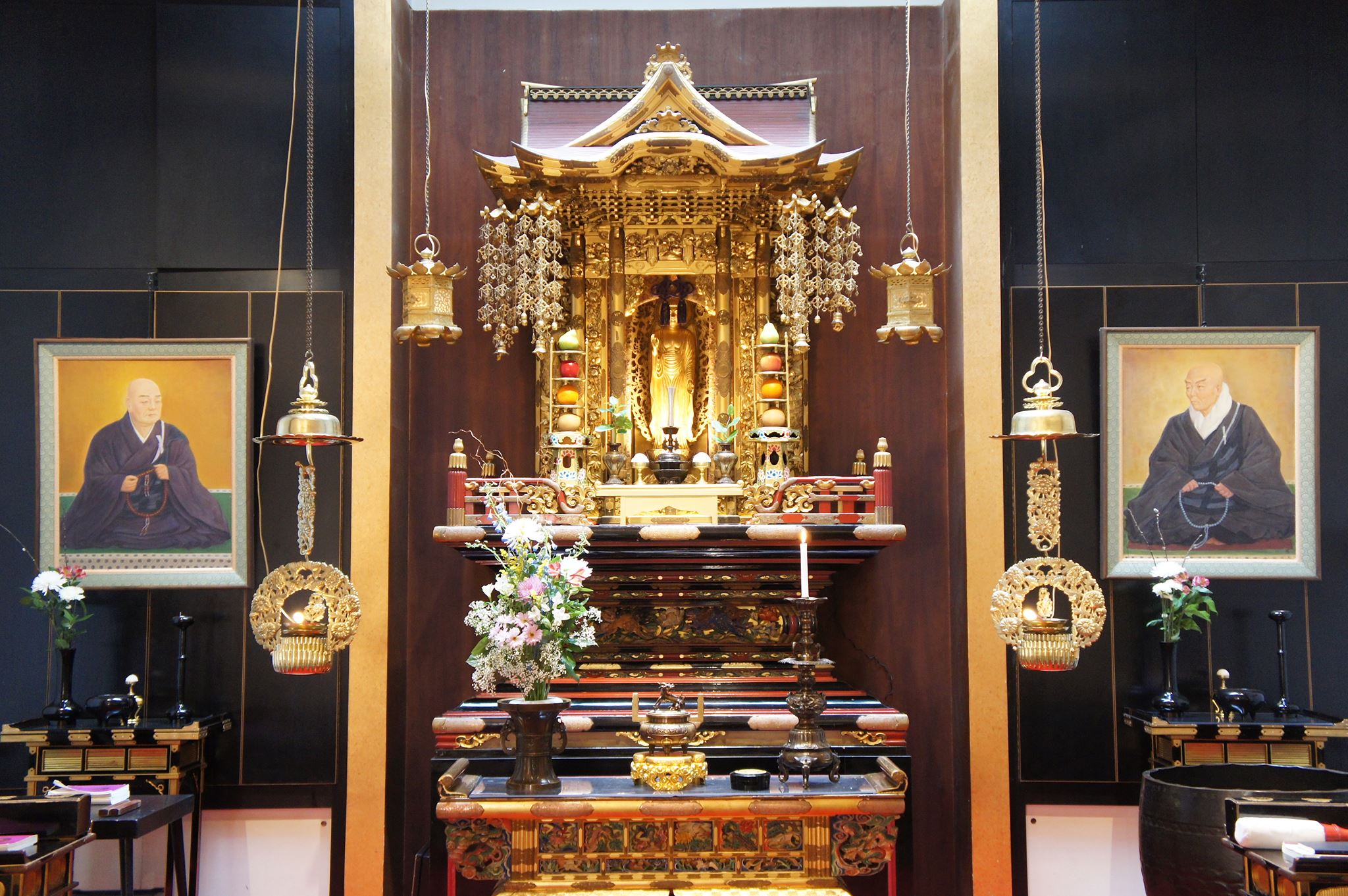
Practices and Events
The NYBC offers service every Sunday morning. The church live-streams the services and publishes the recordings on its youtube channel. In addition to the regular service, they host speakers – sometimes ministers from the church, but often guest speakers from other ministers and temples.
Services are held in a small, brightly colored church with red carpeting and ornate gold decorations. The service begins with the ringing of a Kansho bell. A period of quiet, seated meditation follows. There is then a series of sutra chants in Pali and Japanese, but an English translation is provided. The congregation sings a hymn in both English and Japanese. A minister then gives a dharma talk, discussing and expanding upon the teachings of the Buddha and the Jodo Shinshu tradition. The service continues with more hymns, closing announcements, and expressions of gratitude. New visitors are asked to introduce themselves and are welcomed to the church,
For other weekly established events: on Wednesdays, the Church offers chanting and meditation sessions. Saturdays hold a dharma study or dharma chat with ministers.
In addition to weekly scheduled programming, the NYBC holds memorial services monthly on the first Sunday of the month. Anyone can add loved ones’ names to the list to be included in the service. Services in Japanese are held on the first Thursday of each month. Special memorial services are held for Hiroshima-Nagasaki and September 11th. The Church also celebrates Buddhist holidays, such as Obon and New Year. Extra special events like a ceremony in January for receiving a Buddhist name are offered to members.
In combination with the American Buddhist Study Center, the NYBC offers a plethora of classes: Buddhism and psychology, Buddhist philosophy, meditation, Buddhist and Asian history, book discussion, sutra study, introductory classes, dharma school, and more special workshops like calligraphy, dance, and drumming. The number of learning opportunities available through the NYBC and ABSC makes this Buddhist community very unique.
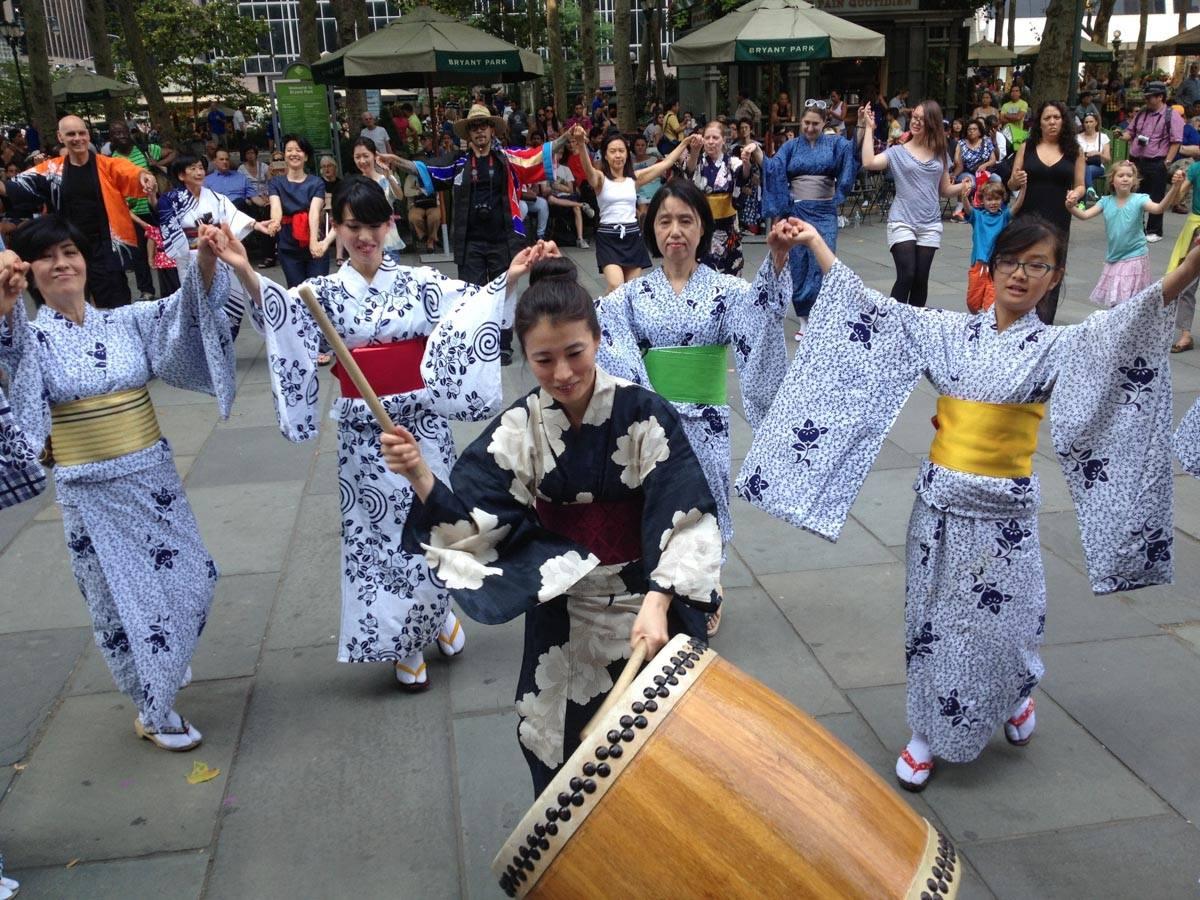
Buddhism Representation at the NYBC
While aligning with the Jodo Shinshu tradition, the NYBC consists of a community that is diverse, open, and dedicated to education. A unique defining factor for the community is how they present Buddhism as accessible.
The NYBC provides programming catered to both those who are new to Buddhism and those who have been practicing their whole lives. From introductory classes on Buddhism to services held fully in Japanese, the NYBC serves a range of patrons.
The NYBC offers many free opportunities for education and involvement, from free online classes and streamed services to open in-person programming. This reduces barriers to entry and welcomes those who are interested in learning about Buddhism. This allows for a community of both Japanese members who grew up with the tradition as well as those who are learning about the religion and perhaps even converting later in life.
The NYBC website defines the purpose of Jodo Shinshu Buddhism as, “a community of people joined together in revering the teaching of Shinran Shonin and saying the Nembutsu. We seek to share with others the wisdom and compassion of Amida Tathagata. By doing so, we shall work toward the realization of a society in which everyone is able to live a life of spiritual fulfillment.” This philosophy of sharing for the greater spiritual good is greatly exemplified in the accessibility of the New York Buddhist Church’s services.

Sources:
https://www.newyorkbuddhistchurch.org
https://www.newyorkbuddhistchurch.org/users/NewYorkBuddhistChurch20613/FundForFuture_Brochure.pdf
https://www.lionsroar.com/profile-the-new-york-buddhist-church/
https://www.historyofjapaneseinny.org/DigitalArchive/Details/138/All/EOldest/7
https://www.hongwanji.kyoto/en/
https://blogs.baruch.cuny.edu/asianamericanhistorynyc/?p=291
https://www.buddhistchurchesofamerica.org/about-bca
By Kasey Pataki